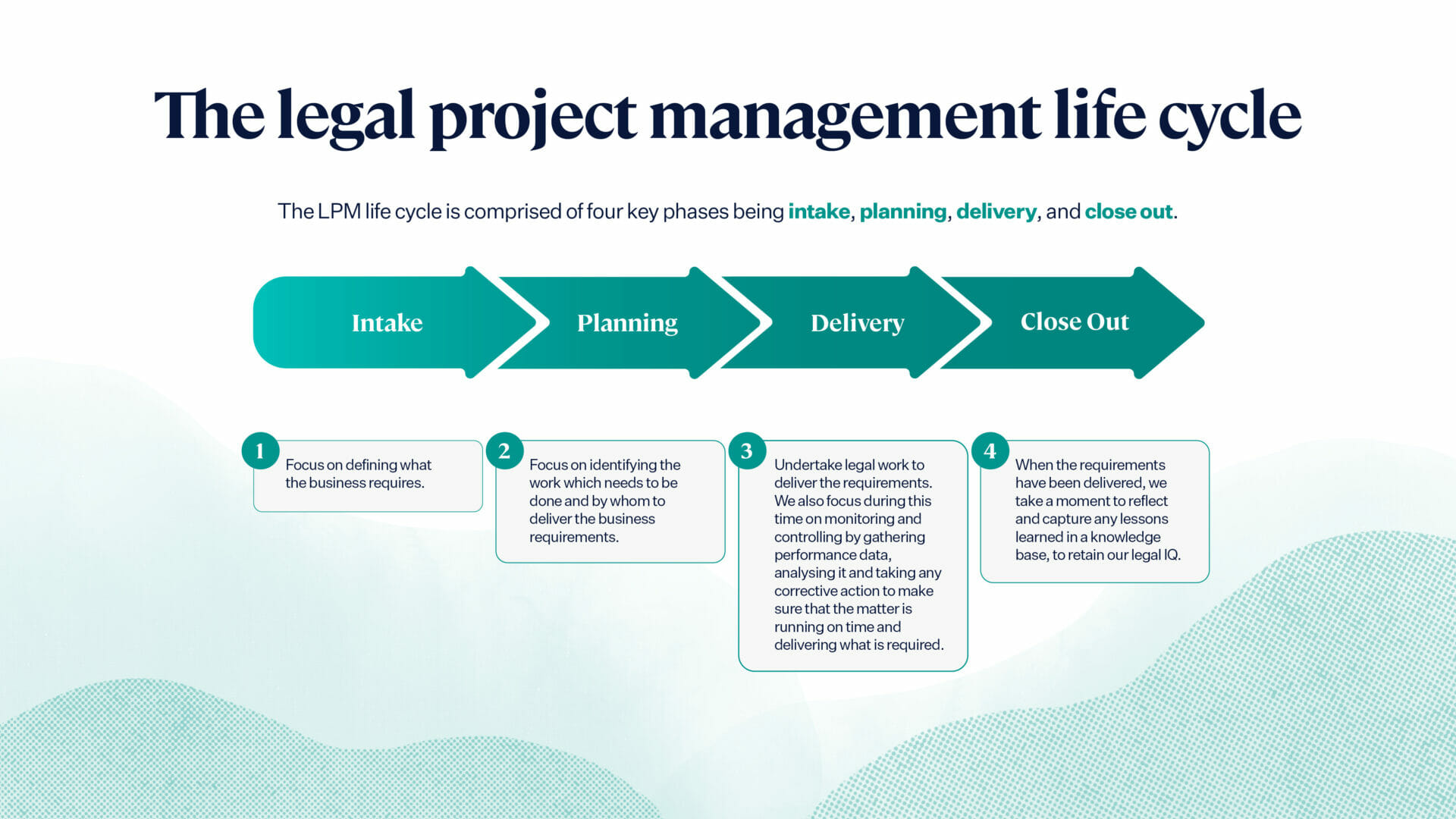Where to start with in-house legal project management

As the volume and complexity of legal work continue to impact the day-to-day workflows of in-house legal teams, legal project management offers a way to ensure the effective and efficient delivery of legal services to the business.
In this article, you’ll learn what legal project management (or LPM) is, its benefits, and a framework to deliver success for the legal team and the business.
What is legal project management?
Legal project management (or LPM) is “the application of project management principles and practices to enhance the delivery of legal services”, as defined by the International Institute of Legal Project Management (IILPM).
With in-house legal, the term ‘project management’ is often synonymous with ‘matter management’, so you’ll often see these terms used interchangeably. For this article, legal project management refers to the process of managing legal projects, and matter management to the tools used to achieve this.
What does a legal project manager do?
The role of a legal project manager is to plan, organize, and control the work, leading all the resources to deliver the business objectives. A project’s (or matter’s) success is measured against the triple constraints of:
- was it delivered on time?
- was it delivered within budget?
- did it meet expectations and achieve the required outcome?
Along with balancing these constraints, regardless of intervening events that may take place during the project, it’s also the role of the legal project manager to be an enabler. This means ensuring things get done by removing roadblocks and barriers to ensure the team can function and focus on the assigned tasks.
And remember, the role of the legal project manager is for any legal professionals, including paralegals, legal operators, and lawyers.
[lv-article-cta button-label=’Get Certified’ button-link=’https://lawvu.com/the-connected-legal-function/the-connected-legal-certification’]Take the Legal project management 101 course now as part of the Connected Legal Certification[/lv-article-cta]
What are the benefits of legal project management?
There are valuable principles from project management that elevate the effectiveness and efficiency of the in-house legal team and contribute to high-functioning legal operations. These principles are helpful to understand when there are larger pieces of work to deliver or when leading a project.
Six key benefits of legal project management are:
1. it gives you the structure and discipline to approach your work so you can deliver legal work (or matters) more effectively and efficiently;
2. the business will be familiar with project management, so using a similar approach will improve collaboration and embed legal within the business;
3. it assists in generating more accurate estimates of your time requirements and helps you to manage the work for delivery within those estimates;
4. it enables well-planned work with a clear-defined path to completion, which clarifies who’s doing what and when;
5. it reduces legal waste and optimizes productivity, so you’re only doing work that’s necessary to deliver what’s needed, and reducing or eliminating work that doesn’t add value to a matter or project; and
6. it improves relationships between the legal team, the wider business, and other stakeholders.
Why is there a need for legal project management skills?
There’s currently a lack of specialized project management skills in many corporate legal departments, says the Corporate Legal Operations Consortium (CLOC), which makes it difficult for legal teams to implement effective initiatives at scale.
CLOC’s finding is echoed in Deloitte’s 2021 State of Legal Operations Survey, which establishes that legal operations staff aren’t necessarily trained in project management. Only 39 percent of respondents agreed that current project and program models allowed the best opportunity to be a strategic partner to other business functions, with only 32 percent using a technology-enabled method to communicate with project stakeholders across the company.
The survey concluded that without the right skills and technology in place — and despite projects being completed — costs are up and efficiency is down.
This means there’s a lot of room for improvement and the opportunity for legal professionals to gain new skills!
The Connected Legal Certification provides lawyers, legal operators, and paralegals with the foundational skills to build and optimize productive, engaged, proactive, and impactful legal teams. In addition to legal project management, courses include contract management 101, how to design an intake system, and ways to showcase legal’s impact on the business.
What are the four stages of legal project management?
The legal project management lifecycle comprises four stages that enable you to fine-tune your projects and be even more impactful.

One: Intake — focus on defining what the business requires
The focus during the intake process is to define the desired outcome and ensure both the legal team and the business agree on expectations. Some elements you’ll need to determine include:
- the rationale behind the request and how the legal output or solution adds value to the business;
- the scope of the matter;
- the timeframes of the project; and
- who are the stakeholders with an interest in the matter, and what are their expectations?
Two: Planning — focus on identifying the work that will deliver the business requirements
Planning is at the heart of legal project management — and a disciplined approach will reap many rewards. The aim is to develop plans to monitor and control the key components of the matter — the triple constraints of time, costs, and scope.
There are two key approaches to planning, and a six-step planning process.
They are:
- identify the specific components of work;
- translate the work into tasks or activities;
- identify any interdependencies between the tasks;
- estimate the time required to complete each task;
- identify the resources (people and materials) required; and
- include the cost estimate or fee arrangement of any work outsourced to an external legal provider, as this becomes your budget.
Three: Delivery — deliver the legal work and focus on monitoring and control
During the delivery phase, the robustness of the legal project’s definition and the planning process are tested, with any deficiencies soon becoming apparent. The focus is now on monitoring and controlling the work to ensure tasks are delivering the requestor’s desired outcomes, and that the outcomes continue to meet the needs of the business.
There are two types of meetings during the delivery phase: kick-off and progress. You can learn more about planning, kick off and progress meetings, and how to create a comprehensive agenda in the Connected Legal Certification.
Failing to plan means planning to fail
If a project fails, the most likely cause is small, incremental slips in time and cost overruns that individually do not cause undue concern but cumulatively have a significant impact. When you learn how to manage these and avoid scope creep, it sets the project up for success.
Four: Close out — capture lessons learned to retain legal IP
Close out is the final step, and allows reflection on what happened during the project, evaluate lessons learned, and assess new legal assets to improve legal delivery going forward.
A close out review with other team members and the business evaluates and assesses what occurred compared with initial estimates and the reasons for any variances, including costs, completion dates, along with how expectations have been met and the capture of assets to further build legal capital.
How to learn more about legal project management
There’s a lot involved with legal project management and one of the best ways to gain skills is to complete Legal Project Management 101 from the Connected Legal Certification. It’s the first certification for all legal professionals that covers everything you didn’t learn in law school or private practice!
